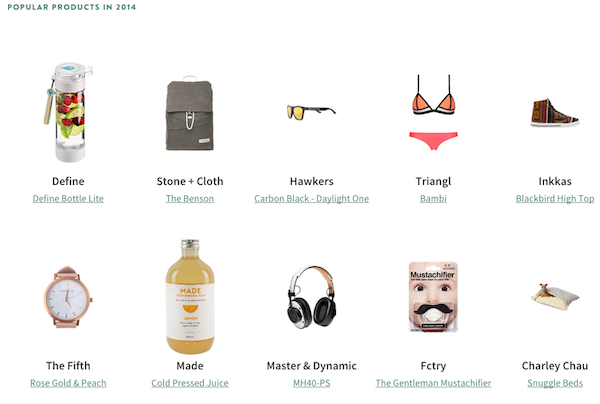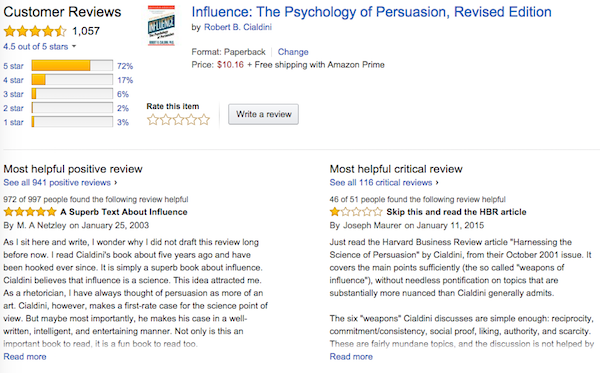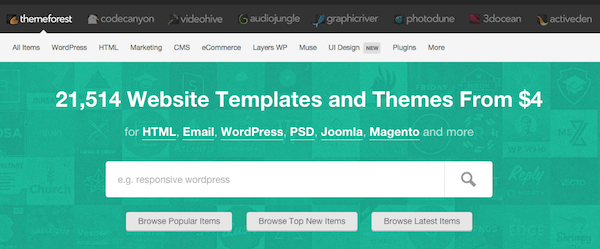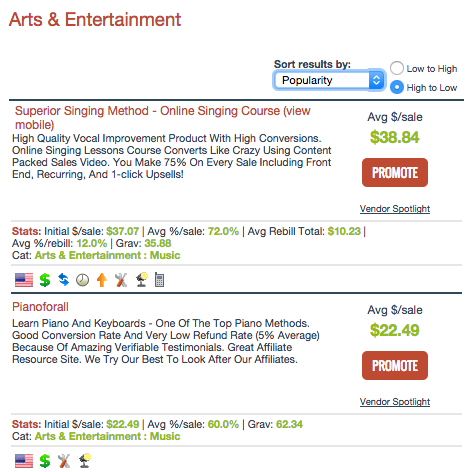I’ve been in the same place that you are right now. Three years ago, I also wanted to start an online business.
I had no idea where to begin and didn’t even know what was out there. I had a bunch of ideas, but no knowing which were doable.
Since then, I’ve grown a successful small online business that includes several different websites that have gotten over one million visits in the past year, including a podcast that attracted 20k+ listeners in the first year.
I’ve learned a TON and want to share my knowledge, along with several business ideas that I have with you. Let me know more about you by leaving a comment on this article!
1. Ecommerce
Ecommerce is booming. Not just on big marketplaces like Amazon or with traditional retailers that have ecommerce stores, but also with small businesses!
According to Shopify, a major small business online store builder, there were 140,000 active Shopify stores in 2014, up from 80,000 in 2013. They did a total of $3.7 billion in sales (33% coming from mobile).
There’s no better time to get in on the ecommerce game. Here’s what you’ll need:
- A product to sell that demonstrates demand.
- Good copywriting, ads, and a marketing strategy.
- A place to sell it.
It depends on your skill set, but I think that the hard part is figuring out what to sell and how to get it made.
I’m going to come up with a few product ideas that you can consider!
First, it’s important to always play to your strengths. The best way that you’re going to know if you have a good product is if you’re a frequent customer of your niche, like fashion apparel or products that are used in a specific hobby.
However, you can also get some general indications of demand by checking out the most popular Shopify products in 2014.
As you can see, customers are willing to spend money on their hobbies, fashion, and personal life. These items fall into the “I want this” category rather than the “I need this to function” category, which is dominated by traditional retailers like Walmart, Target, and Amazon.
Therefore, let’s focus on creating a product that people crave. What hobbies do you have? When is the last time you bought something you wanted? Why did you buy it? What does it say about you?
Once you hone in on a hobby or a reason that you bought something, then you can identify the problems and desires in that niche and come up with product ideas, like:
- A new type of messenger bag for a specific customer demographic, like outdoor enthusiasts
- A new kind of watch specifically for people who care about Zen lifestyle
- A water bottle that is the perfect item for office workers.
As you can see, by creating a specific market within a larger market, it can be easier to create a better product that can beat out the mainstream product because it’s a better fit for a smaller section of the overall market.
You can also look to marketplaces like Kickstarter and some of the quickly funded campaigns. Here are some of the top funded projects on Kickstarter.
Once you get an idea of the demand for certain products, a good understanding of a marketplace and come up with your own idea, it’s time to figure out how to make it and market it, which I’ll go into at a later time.
2. Freelancing
By far, freelancing is the easiest way to make money online and, by hiring freelancers and selling the services of your own contractors, you can create an agency or service-based business.
Creating a successful business really comes down to your own skills and the skills of those that you can hire. You can get an idea of the type of skills that are in demand by browsing marketplaces like
In order to begin an online service-based business, you’re going to need:
- Customer testimonials
- Previous projects you’ve work on
- A good-looking website
- A way to bill customers, track the progress of projects, and communication tools
- A marketing plan
For setting up the website, I’d either set up your own with WordPress + Bluehost (what I use) or using a website building tool like Squarespace.
There are a lot of communication and project management tools out there like Slack, Basecamp, Asana, and more.
Finally, you’re going to need a marketing plan. It’s best to position yourself as a thought leader in your industry and get references from previous customers, but you can also do paid advertising to capture leads.
Here are some ideas for a service-based online company:
- Writing service
- Social media marketing
- Custom video or audio work
- Transcription
- Virtual assistant
Again, it comes down to your skills and the skills of the people you hire.
3. Digital products and courses
In the last 5 years, new software has made it easy to put together digital products and sell them online.
These could include products like:
- Ebook
- Video course
- Audio book
- Templates and blueprints
- Software extensions (plugins, themes, etc).
The key here is that each product has a specific deliverable. If you’re going to buy a plugin or theme, the functionality it offers must enhance your website or business in such a way that it improves the amount of money you can make.
It makes sense to pay $100 for a plugin or theme if it will bring you $1,000 in business over the course of a year. This is the mindset that you should take when thinking of buying or selling digital software extensions.
It also makes sense to invest $25 in an ebook if the insights will help you get hundreds of dollars worth of sales or buy a $200 video course that teaches you so well that you are able to generate $10,000 over the next year.
Unfortunately, I can’t come up with ideas for you in this category. It comes down to your knowledge of a particular industry and skills. But, I can help spur some ideas.
If you’re looking for inspiration, check out the Amazon marketplace and the best seller list in various categories.
Also, be sure to read all of the negative reviews. They can give clues as to what people WANT to learn but didn’t find in this book.
You can also browse online marketplaces like Udemy or Lynda to see which types of courses and content is popular.
In addition, you can look at the most popular themes in marketplaces like ThemeForest to get an idea of a template, theme or extension that you could make.
Finally, you can look at marketplaces like Clickbank to see which products are selling well.
It might seem like actually making the product is the hardest part, but it’s not. The difficult part is making a product that has a real tangible result and marketing and selling it effectively.
4. Virtual group classes
Tools like Google+, Periscope, and Webinar software has made is much easier to hold group virtual classes where one instructor can teach and interact with many students.
If you know what you’re talking about and have student testimonials to prove it, you could combine the above mentioned methods with live coaching to create a successful online business.
I, myself, am thinking about doing this. If you’re interested in being a part of it, just subscribe to my email list.
Again, it’s vitally important that you pinpoint the change that you want to make. How will students be different after they go through your coaching program?
College and universities are able to promise a degree, which is likely to increase your ability to get a job and make more money than someone without a degree.
What can you promise as a tangible end result if they go through your classes?
5. Software startup
Oh boy. I have a history with tech startup life. I’ve tried and failed at at 4 different startups ranging from a restaurant loyalty app to a applicant tracking system for recruiters.
I do enjoy helping other tech startups, but I’m kind of burnt out doing my own. I definitely will try doing another one at some point in time!
I’ve already come up with some tech startup ideas that you can consider stealing. I’ve also gone through some of the major pitfalls you’ll come across if you do try launching a tech startup.
Aside from the problem you’re trying to solve and the marketplace, launching a successful software tech startup comes down to your ability to iterate repeatedly until you hit product market fit.
This mean that you need lots of coding power, a willingness to crank out code and test things out, and usually this means some financing (unless you’re the coder or have a motivated one).
Don’t get me wrong. There are examples of great tech entrepreneurs like Steve Jobs who didn’t know how to code, but they relied on their technical cofounder (Steve Wozniak) to actually propel them into greatness.
Check out:
- How to start a tech startup with no money
- 6 Reasons a Tech Startup Founder Should Know How to Code
- Tech Startup Books You Absolutely Must Read
6. Blogging, podcasting, and YouTube
Finally, you can create a successful online business through blogging, podcasting, or YouTube, but not in the way you might think.
First, let me say, that advertisements rarely are a sustainable strategy when it comes to content. They can be a nice side income stream, but it’s unlikely they’ll make you a millionaire.
Even sites with huge amounts of traffic that rely on Facebook clickbait posts must continually crank out content and are moving towards native advertisements, like on BuzzFeed.
Putting out quality informational content is a good way to become an expert in your niche, which generates leads and sales.
That content could take the form of blog posts, podcast episodes, or YouTube videos. Think of it as a way to get your foot in the door and to begin to establish a relationship with your customers.
But, yes, there are examples of people who have made a sustainable business purely from creating content.
Pat Flynn from the Smart Passive Income blog made $40k+ last month just from affiliate marketing, where he makes money if people use products that he recommends and $7k from podcast sponsorships alone.
John Lee Dumas of Entrepreneur on Fire made $97k+ alone last month from podcast sponsorships.
Here’s a list of bloggers with monthly income reports if you’re interested in seeing how other bloggers make money (who knows if they are truthful).
As another example, look into Michelle Phan, a YouTuber who has built a $84 million dollar business. Keep in mind that she leveraged her relationship with her fans to move beyond advertising and create her own ecommerce business.
If you want to go this route, you must figure out what you want to write or talk about! I would work backwards from your passion (what I did) and come with ideas for topics that way.
Here are a few ideas after you set up your blog (I recommend using BlueHost, what I use):
- Wearable technology
- Drone technology
- Internet of things
- Arduino and the maker movement
- How technology plays into politics (think Donald Trump)
- Getting a job where you can work from home
- Oculus rift and virtual reality technology
My message to you
Take action! Get started! Don’t wait.
You’re not getting any younger and believe me, the sooner you get started the more success you’ll have.
Leave me a comment below and let me know a bit about you and the company you’re thinking of starting :).
Finally, here are some more small business service ideas.







